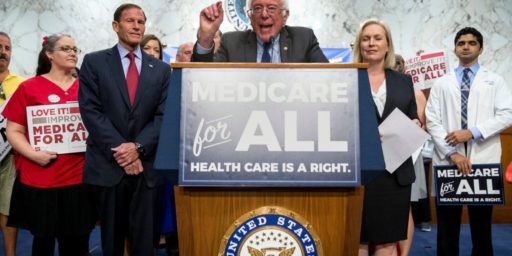More on Health Care as Public/Common Good
In the comment section of my post yesterday on health care policy, a discussion started about the question of whether health care can be construed as a public good (i.e., the ever-popular notion of something that is “non-rivalrous and non-excludable”).
While I no doubt need to further explore the concept in writing, I will point to this 2009 piece from The Economist‘s Democracy in America blog: Universal health insurance is a common good, which addresses the public good concept in context.
As the piece points out, perhaps common good is a better classification rather than public good.






It’s not a notion. It’s a definition.
I think you’re confusing the economic term of art “public good” with something that’s good for the public. A good is something that can be bought or sold. Clearly healthcare is a good. A public good is defined as a good that is non-rivalrous and non-excludable. Equally clearly healthcare is rivalrous and excludable–that’s what we’re arguing about. The economic phrase that describes healthcare is “private good with positive externalities”.
The phrase “common good” may cause trouble, too. It’s used to refer to goods held in common, e.g. “tragedy of the commons”.
If you don’t want to use the mouthful above, “benefit” might be a better choice of words.
Let’s get beyond definitions. The question is how we are to deal with healthcare as a society. We don’t need to draft perfectly good terminology used to describe other things to talk about that.
Did anyone throw infectious disease into the mix?
Reducing tuberculosis in the population benefits everyone (non-excludable), and that sort of thing is where public health started.
And of course a few of the deadly diseases we face are still infectious.
“The phrase “common good” may cause trouble, too. It’s used to refer to goods held in common, e.g. “tragedy of the commons”.”
Well, then, how about the ‘general welfare’?
“how about the ‘general welfare’?”
Governments can do whatever they want. Cities can offer tax advantages to makers of lowbrow movie comedies. They can subsidize sports stadiums that are NOT open to the public. Whatever.
For some reason these guys are interested in an economic definition, and whether health care fits it. It doesn’t really matter from a policy standpoint. But certainly, with non-excludable benefits for the control of infectious disease, it fits the def.
I think that “benefit” is better than “general welfare”, sam. Does every medical procedure contribute to the general welfare? I think that’s a stretch.
john personna brings up a good point in noting that public health measures, e.g. sewer systems, are an excellent case of a public good. I agree. But, once again, not every medical procedure falls into that category. However, every medical procedure is a good in that it is bought and sold, is rivalrous (a surgical team can only perform so many heart bypass operations–some sort of allocation mechanism whether the market or rationing is necessary), and rather obviously excludable. Rivalous + excludable = private good. That’s the definition.
Look, I think we all know what Steve is trying to get at: Access to health care is a right (held in common by all citizens). That’s what’s being argued, whether it is, and, moreover, a right that government has the responsibility to guarantee (via subsidy).
That argument is distinct from arguments about the particular economic effects of this scheme of provision versus that scheme of provision. It’s fundamentally a moral argument.
I agree with that, john personna. A misuse of terminology may be simple ignorance (something I always assume) or it may be Orwellian. The solution is to stop using words, e.g. “public goods”, that have established definitions and implications and use other words in discussing the policy preferences.
As I think I have made clear in my voluminous posting on healthcare over the last six or seven years, I don’t think that we can get where we need to get in healthcare without radical reform. Relatively scarce resources must be allocated by a market, by physicians, or by some third party, e.g. the government.
I think that allocating the resources via market reforms is likely to have adverse public health consequnces. If the allocation is to be done by physicians we must adopt some sort of capitation system coupled with a single payer strategy and total healthcare spending must be capped. If the allocation is to be done by a third party, we’ve also got to cap healthcare spending.
However, when healthcare spending is rising at 5% a year, the non-healthcare economy is rising at 2-3% per year, and the majority of healthcare is paid for via tax dollars it’s rather obvious that the situation is unsustainable.
So you are dividing healthcare Dave? If that’s true you do need to maintain the division.
Reducing those sorts of disease, so that all of us have lower chance of infection is non-rival for us, the yet uninfected.
To follow through and pursue the “public good” you’d need systematic public health for infectious disease.
I imagine we have that in a haphazard way now. If you have tuberculosis now there probably is someone who will buy you your meds, for public health reasons. But is it systematic? I don’t think so. I actually had pneumonia once(*), and used my insurance to pay.
* – it’s true, don’t go out and play in the rain when you have a cold
Ah, we posted at the same time.
Why doesn’t Congress just pass a law that says nobody can get sick?
That would probably be about as effective as tthe cost control measures adopted to date, Patrick.
IMO fee for services has got to go. I don’t believe we can control costs and retain fee for services.
On the issue of “market or rationing” that the market IS a rationing system. When a particular good is in high demand, the market RATIONS that good by raising the price so that some of the participants will either not want the product at the new price or not be able to afford the new price. “Pricing members of the public out” of health care is considered, by some at least, to be a pernicious use of market mechanisms. These people will look at, for example, the phenomenon of a, say 70-some year old former, and alcoholic, baseball player getting a liver transplant in preference to a younger and more viable candidate as an argument for some other form of rationing. As the above example suggests, the system in place now has enough problems without allowing “the biggest wallet” ultimate say.
No. It’s an allocation system. When allocation is done by the government it’s rationing.
From an experiential standpoint is doesn’t make a great deal of difference but from a precision in language standpoint it does.
Whether the terminology is “public good” or “general welfare”, conservatives and liberals have always agreed that healthcare should be available to every citizen regardless of their ability to pay.
The only questions are to what extent and the structure of the system.
The article is wrong, unless definitions mean nothing now. In which case I call Hey Norm a conservative and jwest a liberal and I’m using my current definition which will change at a point in time when it is convenient for me to change it.
Jesus Christ….
Yes, Dave Schuler did when he mentioned the positive external effects of health care. If someone is cured of a disease they can no longer infect others. If they are inoculated before getting the disease same thing and likely for a lower cost.
I’m now defining the word “sam” to be synonymous with “deck chair” and nobody pays attention to those except when they want to sit down.
Not anymore so now snickers are public goods too.
And right there is where we get right back into the unsustainable scenario. Why isn’t housing a right? Clothing? Entertainment? I want to go get a PhD in chemistry. I suck at chemistry, but dammit it is my right!
If you start declaring the people have rights to various private goods then you have a sustainability issue. Where does that right end? Do we keep flinging resources at a medical condition even when the hope of success is near zero?
Yes, but what happens when the unsustainable trend can no longer be sustained? Eventually your morality comes into conflict with scarcity.
Pretty much.
However, I would add that if health care were really and truly a public good the above argument would not even need to be made. The problem is that people consume health care resources. If a team of doctors were really a public good they’d be dealing with all the medical problems at once. Nuclear deterrence is considered a pure public good in that we all consume in equal proportions simultaneously. A team of doctors is not like. This should be freaking obvious.
Health care is not a public good, it is not like nuclear deterrence, it is not even like a public good subject to congestion (i.e. a public road). Nor is like a common good (the common pasture in the tragedy of the commons–i.e. we don’t all use it simultaneously). It is a private good.
Other wise words have no meaning and we should just sit here typing out random strings of letters.
@Verdon
I wasn’t trying to redefine ‘public good’, if that’s what you think you’re replying to. I was only trying to come up with a term more suitable than ‘common good’ (see what preceded my comment) that captured what Steve was trying to say.
You’re not saying, are you, that the fact of scarcity defeats the moral claim?
Private good with external benefits works fine enough. General welfare is something that is rather nebulous and needs considerable clarification. Here is the problem, an increase in the stock of immediately available private goods improves the welfare of everyone. Hence increasing GDP is in the general welfare. Making more snickers bars is in the general welfare. Making more rubber dog poos is in the general welfare. Making more movies is in the general welfare. Providing more health is…in the general welfare. So health care is a good that enhances the general welfare…so what?
I think there are instances where if scarcity really kicks in the moral claim will take a back seat for many people. Eventually simple survival will kick in.
And there very could come a time when people aren’t going to be willing to keep trying to prop up a system that is going to be gobbling up more and more resources for providing health care. Eventually less resources will be allocated and somebody will be told, “You’ll have to make do with a less health care, or even none at all….sorry.”
Once the missile is in place the protection is provides is there for everyone at once. We all consume the same amount simultaneously. You and Sam cannot “consume” the same team of doctors (to put it crudely) simultaneously.
Health care is a by and large a private good, and a number of aspects have positive externalities (e.g. vaccinations). This doesn’t mean that it has to be provided via the market, but at the very least a mechanism for allocating resources for health care in a rational way has to be implemented. That is where we, and pretty much everyone else, has failed.
There are not vaccines for all infectious diseases, and of course many manage to miss them, one way or another.
This is important because TB, AIDS, SARS, etc., do touch every aspect of the healthcare system. Not every person has them, but every hospital treats or at least prepares for them.
The TB resurgence is the strongest example.
It’s an example of where a strongly market solution fails.
Yes, and early on in these discussion over the last couple of days I’m pretty sure I noted that subsidizing health care where there are positive externalities is indeed a reasonable policy response.
Subsidizing hip replacements on the other hand, while a nice thing, doesn’t strike me as conveying much in the way of a positive externality.
@Dave:
Or, it could be a matter of interpretation, a legitimate desire to explore a definition, or any number of other things. It may even be an interest in exploring the very nature of the term itself.
Dichotomization, especially that dichotomy, is a bit unfair, I should think.
However, I will agree that, the semantical issue is not worth fighting over, per se, as it obscures the more substantive discussion.
I wasn’t sure really whether some were choosing to be blind to the common good of infectious disease control. It seemed like it might be a case of ignoring an aspect of nature, to hone in on an aspect of philosophy.
If we know the infectious disease thing is real, can we really discount it, and then move on to an abstract discussion of medical care that presumes a world without it?